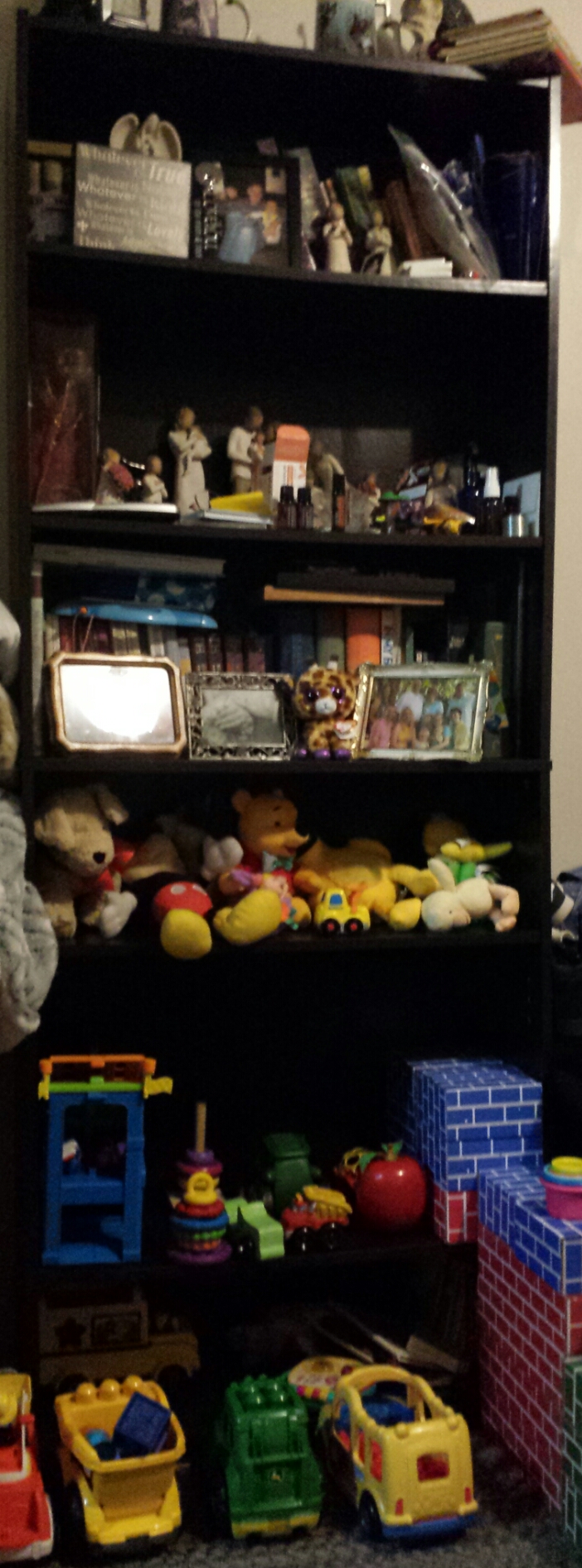A few years ago my heart was breaking. I was struggling so painfully trying to make sense out of a senseless situation. God seemed far away and no one I knew could comfort me. Today I want to tell you the story of how I found peace.
To begin this story I need to back up and begin over 20 years ago…because it took me a long time to figure out the things that made me able to find that peace.
When I was 17, I decided that either God was not good or He was not all
powerful. I was angry at many things in my life but mainly I was angry at God.
My mother tried to woo me back to faith by expressing God’s love for me.
“Why would you care if someone loves you if you think they are a jerk?” That was my response. (I weakened my language out of respect for my Mom.)
I believed in God, that He existed. (Despite great effort I could not bring
myself to believe God was not real. Please believe that I tried. Atheism would have been a sweet relief for my tortured soul.) I still believed in Jesus and sin and our need for forgiveness in order for us to enter Heaven. I still believed in hell. But I did not believe that God was good.
How could a good God condemn people to hell for eternity? Eternity–we can’t
even wrap our little minds around what that means. Eternal punishment for
temporal sins, committed by people hurt and beat down by life, twisted by their
pain who can’t even conceive of eternity. How is that good?
How could a good God allow the incredible suffering that is not caused directly by sin? Disease. Famine. Natural disasters. Only He has control over these
things. They are not caused by any human using their free will to hurt another.
How could He promise healing to His people of their afflictions but then not
heal them when they go through all the steps the Bible lays out to receive
healing. For example, innocent children dying from cancer while their parents
cry out in anguish to a silent sky.
What kind of God offers salvation from hell, only to in the next breath demand
that we live in complete obedience and must confess and repent of any sin to
maintain our promise of heaven? (When I was a little girl, every night I would
pray for God to forgive any sin that I might not know or remember I committed. I was afraid if I died unconfessed of my sins in my sleep I might go to hell.) I was taught that God wanted us to become perfect, but I could never seem to find the power to change, no matter how much I begged, cried, studied the scriptures or had others lay on hands and pray for me.
I refused to fake it. I sat sullen in church. I refused to lay down when the
speaker laid hands on me. If I became offended during church I stood up, walked out of the sanctuary, and sat in the bathroom until the service ended.
I noticed that my church was full of people faking it. You see a lot when you
stop closing your eyes to pray. They were good people. They wanted to be holy,
their hearts were sincere, but they only seemed to really pull it off while they were at church.
I remember one service where two people came to pray for me. The one on the left prayed compassionately that “a bruised reed He will not break.”
The person on my right seconds later prayed warningly that those who fall
“on that stone [Christ] will be broken to pieces; anyone on whom it falls
will be crushed.” I almost laughed out loud in my frustration. Everyone
who prayed for me prayed that I would cease to be confused. I was not
feeling confused. I felt like I was waking up.
This church preached heavily against the evils of legalism, but dictated petty rules. For instance, anyone over age 12 could not wear shorts to services and a teenager could not attend the adult Bible study until they were both 18 and graduated from high school. It didn’t matter if the teenager was bored to tears in youth group or that all her (slightly older) friends had moved out to
be with the adults. Rules were rules. I think they were confused about what legalism is. It infuriated me. But it wasn’t my frustration with that specific church that broke my faith. It was the burden of Lordship Salvation that I had carried since childhood.
For years I heard messages like: “If you are not hearing from God then there is
sin in your life.” and “If Christ is not the Lord of your life and if you are not obedient in all things you are not saved.” I tried. I tried so hard but I always seemed to fall short. Finally I came to the place where I was a senior in high school and begging God to tell me where to go to college. I did this for months and heard nothing. I finally just decided to go
where I wanted to go. I quit even trying to hear from God. I decided that I would screw up my life on my own without first wasting my time and energy trying to get guidance from a God who never answered me.
I didn’t stop believing but I stopped trying. I stopped following. I sat down
in my Christian walk and refused to continue onward. I stopped going to my
family’s church. I went to chapel when I was at my Christian college because it
was required. I even went to a Sunday service elsewhere a few times for a
variety of reasons. But I was always guarded and I never found what I was
looking for. My parents even managed to get me to a service at the Jacksonville
(Florida) Revival that was happening in 1998. I was unmoved in my resolve. I
would have answers or I would not have a relationship with this God. I knew that I could never go back to my old life of trying to stay saved. Obviously, I did not have what it takes to succeed. It seemed to me that if God sent Jesus to save us because we could never be good enough to save ourselves–why was my salvation still dependant on my behavior?
Until I was about 23 I pushed God away from me as hard as I could. I casually
looked for answers, real answers to my hard questions, but no one who tried to
“save” me could ever explain. I learned to swear like a sailor. I did what I wanted. When it suited my purposes, I dropped my morals like a hot potato. I stopped calling myself a Christian because I knew my behavior would only hurt and confuse young believers and reinforce the opinions of people already suspicious of Christianity. I openly expressed my anger at God to whoever wanted to talk to me about such things. I remember one time a Christian lady I was speaking to actually became afraid that God would strike me dead for my extreme irreverence.
But the Spirit never stopped drawing me to God. I was in constant turmoil under
my anger. Finally, one day as I was driving home I cried out to God,
“I cannot believe that You are who I have been taught You are. Show me
who You really are!”
After that I went on a quest for my answers, a quest for truth. I read some
books, like The Case for Faith (by Lee Strobel) and Mere Christianity (by C.S.
Lewis). I read dozens of articles on free grace and eternal security. I attended a house church intermittently for a while, the relaxed atmosphere helped me feel safe. Nobody was trying to impress anybody else there. Most importantly I reread the scriptures like a woman obsessed. I wanted to know what they really said versus what had I been taught and blindly accepted as true. I spent sometimes hours a day studying.
I should have been doing this from a much younger age. My blind, lazy trust in the opinions and teachings of others had caused my faith to be weak. My advice to every young Christian is this: “Know why you believe what you believe. You should be able to defend every doctrine you subscribe to with scripture. Surface faith won’t hold up to real life; platitudes and anecdotes turn to dust. You need to go deep.”
I didn’t find every answer but I found enough to firmly establish in my heart that God is GOOD. I was able to stop living in terror of losing my salvation. I was also able to pray and sing praise and pursue a relationship with God again. It was not perfect, in fact it was very touch and go for a few years. There were things I was doing in my life that I believed were wrong but that I refused to give up. I no longer believed that I would go to hell because of this, but it was a hard place to be. It felt like my soul was burning my insides at times. Even through my inner war I was constantly pulled toward God.
I eventually stumbled upon a book called Truefaced. It helped me tremendously. I was able to start shifting my perspective on what God really wants from me and how the Church is actually supposed to function. (Truefaced was written by Bill Thrall, Bruce McNicol, and John S. Lynch. )
I also read a wonderful book called the Ragamuffin Gospel by Brennan Manning. Somewhere around this time I was able to really start to believe that not only is God good, but He REALLY does love me. He sees all my sin and all my darkness that I try to hide and He still loves me every bit as much as He would if I were perfect.
After I got married, my conscience started resting more easily. I felt like I was no longer blatantly sinning in any way. I still had guilt issues over my past behaviors, especially during my years of anger. I carry my share of regrets. But then I hit a snag, and I entered into the period of suffering I mentioned at the beginning.
 ( A wedding gift that I once found very ironic in the context of our many unanswered prayers.)
( A wedding gift that I once found very ironic in the context of our many unanswered prayers.)
My husband is disabled. He has suffered from increasingly debilitating chronic
pain since he was 15 years old. Everything medical has been tried, most things multiple times. Heaven has been silent to the prayers of his parents, pastors, traveling evangelists, people with gifts of healing, and myself. The laying on of hands, the application of anointing oil and the prayers of the elders have failed. Prayer cloths have failed. There is no explanation and seems to be no hope of recovery. He has continued to get worse and our community of faith is baffled.
As I watched my husband’s quality of life steadily diminish, I started to
struggle again with believing that God cared. At first it was a little struggle
I would try to shrug off, but eventually it began to consume me. It was
excruciatingly painful. And you have to acknowledge that it really looks like
God has abandoned us. It looks bad. The whys that have been asked are
stacked up all the way to Heaven’s gates. The tears that have been cried fill
many bottles.
As I wrestled with this gap between God’s promises and my reality, I prayed for grace, for understanding, and for help. I didn’t know what to do. I spent
a good deal of my time crying. Finally I realized very suddenly that I had to make a decision. I was driving to work when it became clear to me. The situation with my husband being in pain all the time and God not seeming to help him or heal him looks terrible to my eyes and feels even worse than it looks. I don’t understand it and I can’t explain it. It seems to my human mind to run contrary to the promises of God.
Throughout the scriptures God says repeatedly that He loves my husband. And God says He is good, kind, merciful, compassionate and faithful. So, I had to
decide. Do I believe my eyes? Do I believe my heart and its pain? Or do I doubt
how things look to me, doubt how I feel and choose to believe what God says
about Himself is true?
The scriptures tell us that faith is believing God, not believing IN God. Going beyond just believing He exists–to believing what He says: about Himself, about the world, about us. You see, things look pretty awful to me but the God who spoke the universe into existence testifies that He is good and His heart toward us is full of love. Who has the more trustworthy perspective?
So, by the power of the Holy Spirit and God’s grace, I chose and choose to
believe God. After I decided this, I was given a supernatural peace about the
situation. Years of strife and turmoil have evaporated out of my heart. I do not believe that I would have been able to reach this place if I had not alreay cemented in my heart that God is good and that He loves me. My next natural step was to start TRUSTING God, and He graciously enabled me to begin doing that.
Please, don’t misunderstand me. My husband’s suffering and disability has not stopped being hard to live with.
Especially since the birth of our son, my heart breaks that my husband and my
son cannot have a better life. My husband and my son will probably never
do many things that fathers and sons who adore each other the way they do often enjoy doing. Hunting trips, wrestling, playing catch in the yard–it all seems so out of reach.
Of course, there are times that I feel sorry for myself too. I’m human, my situation is difficult, and it does happen. I work, and care for our child, and the house, I pay the bills, I do the shopping, I care for my husband and try to take care of myself. It’s a lot, and sometimes it is too much for me. Something is always
left undone.
But, those times when it is too much, help always shows up in some form.
Sometimes when I have a bad day my husband has one of his better days and can give me extra emotional support or watch TV with our son while I decompress. I am able to lean on my mom, my sister, or my mother-in-law and they have a kind word or even physical help to offer. Whenever I feel ready to break, God by His grace provides for me and I am not broken.
I am not sure why Christians are surprised by the pain and suffering we
encounter in this life. God has been honest about how it’s going to be.
Pain, suffering, tribulation, persecution, injustice and loss will come into
our lives. Sometimes they stay a long time, sometimes they leave for a while
only to come back to visit again. Jesus was perfect, beloved of the Father,
sinless and He suffered greatly anyway. He was hated, chased, plotted against, betrayed, eventually unfairly tried and condemned to an agonizing death. The lives of the Apostles were also far from being free of suffering.
The Bible is full of stories of human pain and suffering from the first chapters of Genesis to almost the end of Revelation. Yet we are shocked, surprised, horrified, angry, convinced that a great injustice has taken place every time we hurt. EVERY TIME.
Good old King David went through some really soul crushing low points in his
life. Some of them he brought upon himself and some were completely unjust. In those difficult times, and they will come for us all, David offers a sound
example of how to hold on:
“I believe that I shall look upon the
goodness of the LORD in the land of the living! Wait for the LORD; be strong,
and let your heart take courage; wait for the LORD!”(Psalms 27:13-14) (English Standard Version)
I have chosen to wait on God. I choose to trust Him. I believe God will set
every wrong thing right perfectly and at the perfect time. What isn’t set
right in this life will be set right in the next beyond what we can even imagine.
This imperfect world filled with suffering and pain is all we know, but God has
told us this world is not forever. Believing God gives me strength,
courage, and peace. Because of this even though my circumstances are difficult
I am not miserable, hopeless or bitter. It is as Jesus said:
“I have spoken these things to you so that you shall have peace in me. You shall have suffering in the world, but take heart, I have overcome the world.” (John 16:33) (Aramaic Bible in Plain English)

(My engagement and wedding rings)
 No photo seemed to fully capture the color I saw in the mirror. But I knew deep down that red never lasts long, so I decided to rock my new look and enjoy watching it quickly fade.
No photo seemed to fully capture the color I saw in the mirror. But I knew deep down that red never lasts long, so I decided to rock my new look and enjoy watching it quickly fade.












 (The western sky from my kitchen window.)
(The western sky from my kitchen window.)











